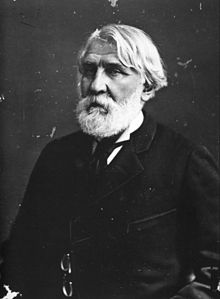Background

| Part of a series on |
| Nihilism |
|---|
| This is a subseries on philosophy. In order to explore related topics, please visit navigation. |
An anti-nihilistic novel [note 1] is a form of novel from late 19th-century Russian literature, that came as a result of the disillusionment in the Russian nihilist movement and revolutionary socialism of the 1860s and 1870s. [1] The genre was influential in shaping subsequent ideas on nihilism as a philosophy and cultural phenomenon. [2] Its name derives from the historical usage of the word nihilism as broadly applied to revolutionary movements within the Russian Empire at the time.
In the more formulaic works of this genre, the typical protagonist is a nihilist student. In contrast to the Chernyshevskian character of Rakhmetov however, the nihilist is weak-willed and is easily seduced into subversive activities by a villain, often a Pole (in reference to Polish nationalist insurrectionary efforts against the Russian Empire). [note 2] [3] The more meritous works of this genre managed to explore nihilism with less caricature. [3] Many anti-nihilistic novels were published in the conservative literary magazine The Russian Messenger edited by Mikhail Katkov. [1]

Nihilism, (from Latin nihil, "nothing"), originally a philosophy of moral and epistemological skepticism that arose in 19th-century Russia during the early years of the reign of Tsar Alexander II.
Nihilism was a broad social and cultural movement as well as a doctrine.
The philosophy of nihilism then began to be associated erroneously with the regicide of Alexander II (1881) and the political terror that was employed by those active at the time in clandestine organizations opposed to absolutism.
The major theorists of Russian Nihilism were Nikolai Chernyshevskii and Dmitrii Pisarev, although their authority and influence extended well beyond the realm of theory.
and antinihilistic novels, notably A. F. Pisemsky's Troubled Seas, N. S. Leskov's Nowhere to Go, and V. P. Kliushnikov's The Mirage
{{cite book}}: CS1 maint: location missing publisher (link)